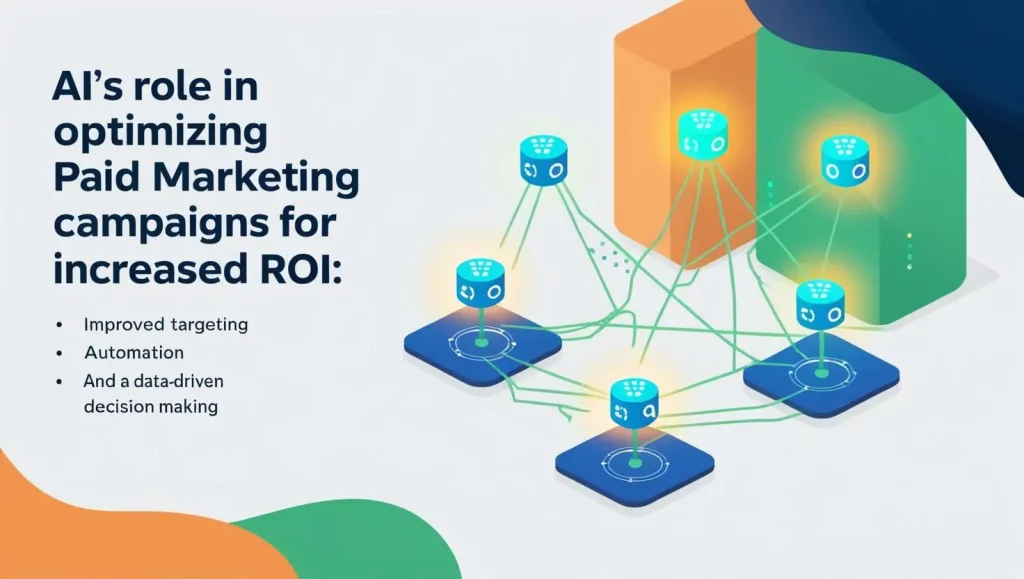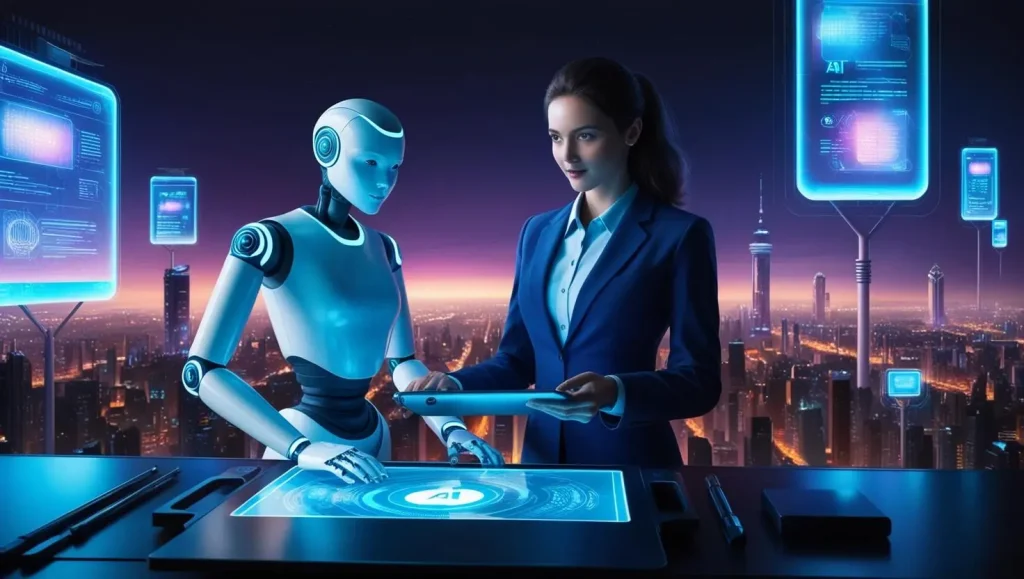“Digital marketing is rapidly transforming with Artificial intelligence, could AI really drive 75% of all engagements by 2025?”

AI seems like something out of sci-fi movie, but this is the reality businesses are moving towards it. Artificial intelligence is no longer just a futuristic concept—it’s actively shaping the way we market and connect with consumers today. From personalized shopping experiences to smarter ad targeting, AI is revolutionizing the digital marketing landscape, and if you’re not paying attention, you might already be falling behind.
In this post, we’ll explore how AI is transforming everything from content creation to customer service, and how you can harness its power to stay ahead of the competition.”
AI: The Game-Changer in Digital Marketing
“Visualize a world where every advertisement you see feels like it was tailor-made just for you.
Where emails land in your inbox with offers you actually want, and customer service is available at the touch of a button—24/7. As voice search continues to grow, AI also plays a key role in optimizing content for voice queries, making brands more accessible to users who rely on voice-activated devices like Alexa and Siri. This isn’t the future; it’s happening right now, thanks to artificial intelligence.
AI is not just a Mantra anymore—it’s the powerhouse driving some of the most innovative transformations in the marketing world. From automating tedious tasks to delivering hyper-personalized experiences, AI is revolutionizing how brands connect with consumers.
In terms of advertising, AI platforms like Google Ads and Facebook Ads use machine learning to fine-tune ad delivery, ensuring that the right audience sees the right message at the optimal time. AI’s ability to automate and personalize email marketing is another major advantage, enabling businesses to send highly relevant content to specific segments of their audience at the perfect moment, thus increasing open rates and conversions.
AI is not just an enhancement to digital marketing strategies but a fundamental game changer, enabling businesses to make smarter, data-driven decisions, streamline their operations, and provide a more personalized, efficient experience for customers.
As AI continues to evolve, its role in digital marketing will only grow more important, making it an essential tool for any modern marketing strategy.
Tailored Experience: The power of AI Personalization
Ever been surprised by how accurately an online store recommends products you didn’t even know you wanted?
Or how a streaming service seems to know exactly what movie or show you’re in the mood for? That’s not coincidence—that’s the magic of AI personalization at work.
Artificial intelligence has redefined the way businesses engage with customers, allowing them to offer experiences that feel uniquely tailored to each individual. From personalized product recommendations to custom marketing messages, AI is turning traditional marketing on its head by delivering content that resonates more deeply with audiences.

“In today’s fast-paced digital landscape, customers are no longer satisfied with generic, one-size-fits-all experiences. They want interactions that feel tailored to their unique needs, preferences, and behaviors. This is where artificial intelligence (AI) comes into play. AI has the power to analyze vast amounts of data and deliver hyper-personalized experiences, whether it’s through product recommendations, dynamic website content, or customized email campaigns.
By using AI to predict customer preferences and anticipate their needs, businesses can forge deeper, more meaningful connections with their audience. In this post, we’ll dive into how AI personalization is transforming marketing strategies, enhancing customer satisfaction, and driving greater engagement and loyalty.”
Automating Success: How AI Optimizes Campaigns
“Imagine running a marketing campaign that not only runs itself but also learns and improves as it progresses. This is the power of AI in action. From automating tedious tasks like content creation to optimizing ad placements and targeting, AI is revolutionizing how businesses manage their marketing campaigns. By analyzing real-time data and making decisions at lightning speed, AI can continuously adjust strategies to maximize performance and ROI.
“Imagine having a tool that not only helps you create engaging content effortlessly but also ensures that your marketing campaigns run smoothly and efficiently, optimizing performance along the way. By automating time-consuming tasks like content creation, ad placement, and performance tracking, AI allows marketers to focus on strategy while leaving the heavy lifting to advanced algorithms. With AI at the helm, businesses can generate personalized content at scale, schedule posts for maximum engagement, and continuously adjust campaigns in real-time to achieve optimal results.
The Future of Customer Interaction :Chatbots and Virtual Assistants
“What if your customers could get the answers they need instantly, 24/7, without ever having to wait or hold or navigate through endless menus ? This is AI-powered conversations. From chatbots to virtual assistants, artificial intelligence is revolutionizing customer engagement by offering instant, personalized responses.
AI can analyze customer queries in real-time, understand intent, and deliver accurate solutions, all while learning and improving with every interaction. This technology not only enhances customer satisfaction but also helps businesses scale their operations and maintain consistent, high-quality service .
As the technology behind chatbots and virtual assistants continues to improve, the line between human and AI-driven interactions is becoming increasingly blurred. AI is evolving to understand and process more complex conversations, meaning that chatbots and virtual assistants will be able to handle more intricate requests with greater ease. Additionally, the integration of voice recognition and sentiment analysis will allow these tools to understand not just what a customer is saying, but how they feel, enabling more empathetic and effective responses.
The future of customer service is undoubtedly digital, and businesses that leverage chatbots and virtual assistants will be well-positioned to thrive in this new era of customer engagement.
Predicting the Future: Data-Driven Decision with AI
AI-powered data-driven decision-making for future prediction is quickly emerging as a key component of contemporary corporate strategies. AI is revolutionizing how businesses predict trends, make choices, and optimize their operations by analyzing massive volumes of data in real time and revealing hidden patterns. Organizations are gaining a competitive edge in a market that is unpredictable thanks to the transition from intuition-based decision-making to a more objective, data-driven approach.
AI’s predictive powers are being applied in sectors such as banking to estimate risk, identify fraud, and forecast market movements. Artificial intelligence (AI) models can forecast price movements or economic shifts by evaluating previous market data, giving financial institutions and investors information to help them make decisions.
Algorithmic trading, for instance, makes real-time trades and forecasts stock values using AI, frequently more quickly and precisely than human traders. Similar to this, AI can forecast the possibility of claims in the insurance sector, assisting businesses in evaluating risk more accurately and establishing pricing schemes that are more in line with real odds.
Predictions can always be affected by external circumstances and uncertainties, particularly in environments that are unstable or changing quickly. AI should therefore be utilized in conjunction with human judgment and skill, even though it can assist organizations in making better decisions.
Smarter Ads Bigger ROI: AI in Paid marketing

One of the most exciting developments in AI for paid marketing is AI-driven creative generation .Platforms like Google’s AutoML and Adobe Sensei are pushing boundaries by leveraging AI to craft dynamic ad creatives—such as text, images, and even videos—tailored to specific audiences.
What’s intriguing is how these tools can not only generate different ad variations at scale but also optimize them in real-time. For instance, AI can analyze user interactions with ads and automatically adjust elements like the messaging, design, and even the call-to-action based on what resonates most with particular segments of the audience.
This level of personalization, combined with real-time creative optimization, ensures that every user sees the most relevant and compelling ad. It significantly reduces the need for manual testing and iteration, ultimately leading to more engaging content, improved user experience, and an exponential increase in conversion rates—all while making ad spend more efficient.
The combination of intelligent creative generation and optimization opens up a new frontier for marketers to engage their audience in ways that were previously time-consuming or simply not possible at scale.
SEO Meets With AI Revolutionizing Search Rankings
The impact of AI on SEO has significantly transformed how search engines interpret and rank content. Traditionally, SEO strategies focused heavily on keyword optimization, aiming to match terms exactly as users typed them into search engines. However, with the advent of AI-powered algorithms like Google’s RankBrain and BERT, this approach has evolved.
AI now enables search engines to better understand user intent and context behind searches rather than just focusing on exact keyword matches.
As a result, businesses must now focus on providing valuable, informative content that answers users’ needs, rather than simply optimizing for a set of target keywords. This shift encourages content that is more naturally written and contextually relevant, rather than purely designed to satisfy algorithmic requirements.
AI’s influence on SEO is also reshaping the way businesses approach voice search optimization. With the rise of voice assistants like Siri, Alexa, and Google Assistant, voice searches are becoming more conversational, with users asking questions in a natural language format.
In this new landscape, SEO strategies will need to be dynamic and adaptable, utilizing AI-powered tools to stay competitive while meeting the growing expectations of modern search algorithms.
The Road Ahead: AI’s Future in Digital Marketing

The future of AI in digital marketing is poised to revolutionize the way businesses engage with consumers and optimize their strategies. One of the most exciting developments is the rise of hyper-personalization, where AI will enable marketers to deliver highly tailored experiences by predicting customer needs in real time. Using predictive analytics, AI can anticipate consumer behavior, offering personalized product recommendations or targeted content even before customers explicitly express interest.
This level of personalization will create deeper connections with consumers and drive higher conversion rates. Alongside this, AI-generated content will play a major role, automating the creation of everything from blog posts and social media updates to videos, thus allowing brands to produce creative materials at scale while ensuring they are optimized for each audience segment.
With AI’s ability to analyze vast amounts of consumer data, marketers must prioritize transparency and responsible data usage. Striking a balance between personalization and privacy will be critical as AI evolves. In conclusion, the future of digital marketing is deeply intertwined with AI, and businesses that adopt these emerging trends—whether it’s hyper-personalization, voice search optimization, or AI-powered content creation—will be well-positioned to thrive in an increasingly competitive landscape.
The next phase of digital marketing will be defined by AI’s ability to improve customer experiences, improve efficiency, and enable more dynamic, data-driven strategies